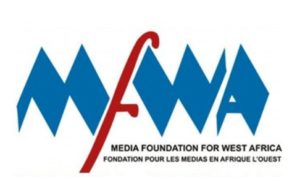MFWA sues NCA over Right to Information request
 The press freedom organization, Media Foundation for West Africa (MFWA) has sued the National Communication Authority (NCA) over a Right to Information (RTI) Law request. This is the first time a suit is being filed in an RTI request issue.
The press freedom organization, Media Foundation for West Africa (MFWA) has sued the National Communication Authority (NCA) over a Right to Information (RTI) Law request. This is the first time a suit is being filed in an RTI request issue.
In a press release copied to ghanabusinessnews.com, the MFWA says it has filed a suit at an Accra High Court against the NCA, the state institution responsible for regulating media frequency in Ghana.
According to the MFWA, its Executive Director, Sulemana Braimah, submitted an access to information request to the NCA on July 22, 2020, in exercise of rights guaranteed under Article 21(1)(f) of Ghana’s 1992 Constitution and under Ghana’s Right to Information Act, 2019 (Act 989).
The organization says it had requested from the NCA the full list of all FM radio stations (indicating name of company, name of radio station, location and frequency number) that it had shut down following the Authority’s 2017 FM spectrum audit which, according to the NCA, was in line with the 2018 decision of the Electronic Communications Tribunal.
The organization said it had also requested for the full list of all authorised FM stations as of the second quarter of 2020, with indications of the dates of first authorisation, dates of last authorisation renewals, locations, and operational status of the radio stations – that is whether they are on air or off-air.
It indicated that it further wanted to know reasons why the NCA made changes to exclude certain information from its published 2020 second quarter report titled: “List of Authorised VHF-FM Radio Stations in Ghana as at Second Quarter 2020,” compared with other similar reports it had previously issued.
The MFWA says after the NCA had acknowledged its letter, it did not provide the requested information within the statutory 14 days, prompting it to send a follow-up letter on August 18, 2020.
“Subsequently, the media regulator wrote two letters in reply. In the first letter, it indicated that the Authority was not going to provide explanations for the changes it had made to its report. In the second letter, the regulator asked the MFWA to pay a whopping GH¢2,000 to enable it generate the requested information. It said it based its action on its law, the Electronic Communications Act,” the release said.
But according to the MFWA, convinced that the amount the NCA is demanding is prohibitive and liable to set a bad precedent, and a breach of the fundamental right to access information, it decided to file a suit, but this was after an appeal for a second look through its lawyers was ignored by the NCA.
In the suit, the MFWA argued that, the NCA had acted “unconscionably, unjustifiably, unreasonably, unfairly and arbitrarily and in breach of specific provisions of Act 989 complained about in the suit.”
The MFWA is therefore seeking the following reliefs from the Court;
A declaration that the decision and demand by Respondent contained in its letters dated July 29, 2020 and August 20, 2020 complained about are unlawful, unreasonable, unfair and in violation of Applicant’s constitutional and fundamental right to access information.
A declaration that the amount of GH¢2,000 demanded by Respondent from the Applicant in order to generate the information constitutes constructive denial, refusal, failure or neglect and breach of Applicant’s right to information under article 21(1) (f) of the 1992 Constitution of Ghana;
A declaration that the amount demanded is not only unlawful but unconscionably exorbitant in breach of the letter and spirit of Act 989 and Applicant’s fundamental rights to information;
A declaration that the information requested by the Applicant is not subjected to a charge/fee; or in the alternative;
A declaration that if Applicant were liable to a charge/fee, same ought to be an ascertainable amount to cover the actual cost of reproduction or photocopy of the information sought only.
The MFWA says it is additionally, seeking an Order of the Court in enforcing its rights to information under article 21(1) (f) of the Constitution by compelling the Respondent to provide the information requested.
The case, which was filed on November 27, 2020 was scheduled to be heard for the first time on March 15, 2021 but has been adjourned to March 31, 2021 as the Human Rights Court 1 did not sit on set date.
Ghana finally passed the Right to Information Bill into law on Tuesday March 26, 2019, 20 years after the Bill had been initiated.
The President, Nana Akufo-Addo, assented to the Bill on live TV, but no one has been able since the passing of the law, to access information through the process.
By Emmanuel K. Dogbevi
Copyright ©2021 by NewsBridge Africa
All rights reserved. This article or any portion thereof may not be reproduced or used in any manner whatsoever without the express written permission of the publisher except for the use of brief quotations in reviews.
